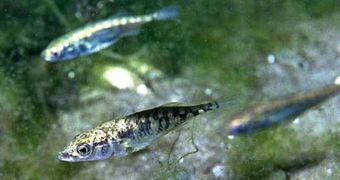An average person would find it very difficult to focus on a given task if someone was shouting loudly in their ear, or if a colleague at the workplace had a stereo on at full volume. In a new study, it was found that fish have the same problem too, when subjected to unusual noise.
They cannot shake off the effects of artificial sound anymore than we can shake off the noise of a jackhammer working outside our windows. These are the conclusions of a research carried out by experts at the University of Bristol, in the United Kingdom.
In the experiments, whenever noise was added to fish's natural habitats, the animals became distracted, and could not continue their normal feeding behavior. Experts used underwater speakers in order to play back noises to the fish.
The kicker is that the science team used noise fish are normally accustomed with, such as for example that made by recreational speedboats passing by. Regardless of how brief the noise was, the fish became less efficient at finding food once exposed to it.
They also made more mistakes, and could no longer find the optimum route to consume nearby food in the most efficient manner possible. The work was carried out on three-spined sticklebacks.
This species, called Gasterosteus aculeatus, “appeared to be distracted by the addition of noise to their environment,” explains the lead author of the study, Dr. Julia Purser.
“Much as you or I might struggle to concentrate on a difficult assignment when faced with loud construction noise, these sticklebacks seemed unable to keep their mind fully on the job at hand, attending to random items of tank debris and mishandling food items more frequently when noise was played,” she adds.
It was also found that, regardless of the noise, these fish do not abandon feeding behavior altogether. Rather, they become less efficient at it. The briefest period of noise exposure was 10 seconds.
In real-life conditions, these reductions in efficiency could have negative consequences, the team explains, such as for instance exposing the fish to increased risks of falling victim to predators.
If they cannot forage efficiently, then they need to forage for longer, and this makes them a target for a wide variety of predators. In the wild, noise pollution is considerable, and takes place all the time.
“Noise pollution is a rapidly increasing issue of global concern, especially underwater,” says the leader of the research team, study co-author Dr. Andy Radford. He is also based at the university.
“Although lots of research has considered the potential impacts on marine mammals, we know relatively little about how fish are affected, despite their critical importance as a food source for the burgeoning human population,” he adds.
“Our study suggests there could be a much wider range of detrimental effects than previously thought, and so there is a vital need for further research,” Dr. Radford concludes.

 14 DAY TRIAL //
14 DAY TRIAL //